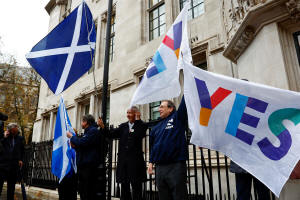Blow for Scottish nationalists as UK court rejects independence vote bid
 Send a link to a friend
Send a link to a friend
 [November 23, 2022]
By Michael Holden and Andrew MacAskill [November 23, 2022]
By Michael Holden and Andrew MacAskill
LONDON (Reuters) - The Scottish government cannot hold a second
referendum on independence without approval from the British parliament,
the United Kingdom's top court ruled on Wednesday, dealing a hammer blow
to nationalists' hopes of holding a vote next year.
Scottish First Minister Nicola Sturgeon, leader of the pro-independence
Scottish National Party (SNP), had announced earlier this year she
intended to hold an advisory vote on secession next October, but that it
had to be lawful and internationally recognised.
After the UK Supreme Court ruled she could not do so without the
approval of the United Kingdom parliament, she repeated her vow to
campaign in the next UK-wide election, expected to be held in 2024,
solely on a platform of whether Scotland should be independent, making
it a "de facto" referendum.
"We must and we will find another democratic, lawful and constitutional
means by which the Scottish people can express their will. In my view,
that can only be an election," Sturgeon told reporters.
"As of today, democracy is what is at stake ... It is now about whether
or not we even have the basic democratic right to choose our own
future," she said.
In a referendum in 2014, Scots rejected ending the more-than
300-year-old union with England by 55% to 45%, but nationalists argue
that the vote for Brexit two year later, which the majority of Scottish
voters opposed, changed everything.

However, the British government in London has repeatedly said it would
not grant permission for another plebiscite, saying it should be a
once-in-a-generation event.
In a unanimous verdict of five judges, the Supreme Court ruled the
Scottish government could not pass legislation paving the way for an
advisory second referendum without the approval of the UK parliament.
"We respect the clear and definitive ruling of the Supreme Court,"
British Prime Minister Rishi Sunak said.
"I think that the people of Scotland want us to be working on fixing the
major challenges that we collectively face, whether that's the economy,
supporting the NHS (National Health Service), or indeed supporting
Ukraine, now is the time for politicians to work together."
NO WAY FORWARD FOR NATIONALISTS?
Under the 1998 Scotland Act, which created the Scottish parliament and
devolved some powers from Westminster, all matters relating to the Union
of the Kingdoms of Scotland and England are reserved to the UK
parliament. The court concluded any referendum, even advisory, would be
a reserved matter.
[to top of second column]
|

Pro-Scottish independence campaigners
protest outside the United Kingdom Supreme Court as a case continues
to decide whether the Scottish government can hold a second
referendum on independence next year without approval from the
British parliament, in London, Britain November 23, 2022.
REUTERS/Peter Nicholls

Sturgeon said it was now an issue of democracy.
"Let's be absolutely blunt, a so-called partnership in which one
partner is denied the right to choose a different future, not even
to ask itself the question cannot be described in any way as
voluntary or even a partnership at all," Sturgeon said.
Her left-wing SNP, which has dominated Scottish politics for more
than a decade, winning the overwhelming majority of Scottish seats
in the 2019 UK election, has argued that the refusal of the British
government to allow another vote means the views of Scots are being
ignored.
London argues it be wrong to hold another divisive independence vote
during a cost of living and energy crisis, while war rages in
Ukraine and the country recovers from the coronavirus pandemic.
Independence campaigners say it should be for Scotland to decide how
to respond to these major issues, given that the right-wing British
government is unpopular in Scotland, where support for Sunak's
Conservative Party is currently running at about 15% according to
latest polls.
More than a dozen pro-independence rallies are planned across
Scotland and parts on Europe on Wednesday with the largest expected
outside the Scottish parliament in Edinburgh where supporters will
claim that democracy is being denied.
Should there be a second referendum, polls suggest voters remain
evenly split and a vote would be too close to call, with what
currency an independent Scotland would use or whether it could
rejoin the EU, the key issues.
Critics say Sturgeon and the SNP have failed to answer these
questions adequately.
"Achieving independence is not just desirable, it is essential if
Scotland is to escape the disaster of Brexit, the damage of policies
imposed by governments we do not vote for and the low growth high
inequality economic model that is holding us back," Sturgeon said.
"I think it's safe to predict that this will not be my last words on
the matter," she added.
(Reporting by Michael Holden and Andrew MacAskill; Editing by Toby
Chopra and Kate Holton)
[© 2022 Thomson Reuters. All rights
reserved.]
This material may not be published,
broadcast, rewritten or redistributed.
Thompson Reuters is solely responsible for this content. |